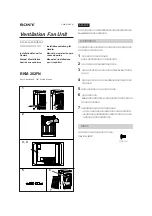
Operating instructions
D2E133-AM31-05
Translation of the original operating instructions
In the event of further malfunctions, contact ebm-papst.
5.1 Cleaning
NOTE
Damage to the device during cleaning
Malfunction possible
→ Do not clean the device using a water jet or high-pressure
cleaner.
→ Do not use any acid, alkali or solvent-basedcleaning
agents.
→ Do not use any pointed or sharp-edged objects for cleaning
5.2 Safety inspection
What to check
How to check
How often
What action?
Contact
protection
cover for
intactness or
damage
Visual inspection At least every
6 months
Repair or
replacement of
device
Device for
damage to
blades and
housing
Visual inspection At least every
6 months
Replacement of
device
Fastening the
cables
Visual inspection At least every
6 months
Fasten
Insulation of
cables for
damage
Visual inspection At least every
6 months
Replace cables
Impeller for
wear/deposits/
corrosion and
damage
Visual inspection At least every
6 months
Clean impeller
or replace device
Abnormal
bearing noise
acoustic
At least every
6 months
Replace device
5.3 Disposal
For ebm-papst, environmental protection and resource preservation are
top priority corporate goals.
ebm-papst operates an environmental management system which is
certified in accordance with ISO 14001 and rigorously implemented
around the world on the basis of German standards.
Right from the development stage, ecological design, technical safety
and health protection are fixed criteria.
The following section contains recommendations for ecological disposal
of the product and its components.
5.3.1 Country-specific legal requirements
NOTE
Country-specific legal requirements
Always observe the applicable country-specific legal
regulations with regard to the disposal of products or waste
occurring in the various phases of the life cycle. The
corresponding disposal standards are also to be heeded.
5.3.2 Disassembly
Disassembly of the product must be performed or supervised by
qualified personnel with the appropriate technical knowledge.
The product is to be disassembled into suitable components for disposal
employing standard procedures for motors.
WARNING
Heavy parts of the product may drop off. Some of the
product components are heavy. These components
could drop off during disassembly.
This can result in fatal or serious injury and material damage.
→ Secure components before unfastening to stop them falling.
5.3.3 Component disposal
The products are mostly made of steel, copper, aluminum and plastic.
Metallic materials are generally considered to be fully recyclable.
Separate the components for recycling into the following categories:
●
Steel and iron
●
Aluminum
●
Non-ferrous metal, e.g. motor windings
●
Plastics, particularly with brominated flame retardants, in accordance
with marking
●
Insulating materials
●
Cables and wires
●
Electronic scrap, e.g. circuit boards
Only ferrite magnets and not rare earth magnets are used in external
rotor motors from ebm-papst Mulfingen GmbH & Co. KG.
;
Ferrite magnets can be disposed of in the same way as normal iron
and steel.
Electrical insulating materials on the product, in cables and wires are
made of similar materials and are therefore to be treated in the same
manner.
The materials concerned are as follows:
●
Miscellaneous insulators used in the terminal box
●
Power cables
●
Cables for internal wiring
●
Electrolytic capacitors
Dispose of electronic components employing the proper procedures for
electronic scrap.
→ Please contact ebm-papst for any other questions on disposal.
Item no. 11204-5-9970 · ENU · Change 202174 · Approved 2018-12-27 · Page 10 / 10
ebm-papst Mulfingen GmbH & Co. KG · Bachmühle 2 · D-74673 Mulfingen · Phone +49 (0) 7938 81-0 · Fax +49 (0) 7938 81-110 · [email protected] · www.ebmpapst.com




























